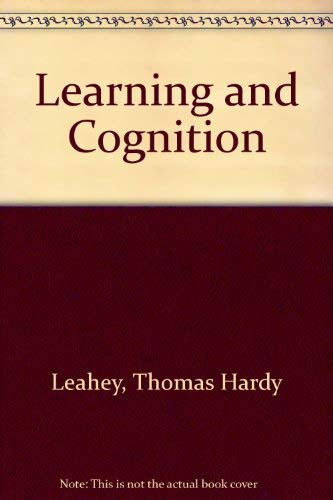Items related to Learning and Cognition

"synopsis" may belong to another edition of this title.
Preface
The great systematic controversies that used to shape the field of learning and cognition are over. With the exception of the small community of radical behaviorists, the study of learning and cognition belongs to cognitive science and the computer model of mind, whether symbol-system based or connectionist. Our book has been reorganized to reflect this fact. The prior emphasis on metatheoretical disputes is greatly reduced, and the text is now organized to move from the simple aspects of learning and cognition to the more complex. Part I provides a general overview of the field, first through history and philosophy (Chapter 1) and then through discussion of the architectures of cognition that guide today's cognitive scientists (Chapter 2, Chapter 10 in the fourth edition). This chapter also now contains a treatment of evolutionary theory and human evolution, including the evolution of intelligence. Part II is a two-chapter version of the previous three chapters on behaviorist theories of conditioning and learning, focusing now on the simpler processes of cognition as studied primarily in animal models. Discussions of Hull, Tolman, and Skinner remain (Chapter 4), but the space devoted to them has been reduced, and their treatment now is organized around a few general empirical issues in the study of conditioning. Part III moves into the realm of information processing (Chapter 5) and memory (Chapter 6). Part IV treats the higher mental processes of language (Chapter 7), comprehension and discourse (Chapter 8), and thinking (Chapter 9). These chapters include dozens of new references from the 1990s to reflect the many advances in the field since the fourth edition. Part V is concerned with the development of cognition (Chapter 10) and language (Chapter 11).
In general, the biggest change in the new edition reflects the increasing importance of cognitive neuroscience, which is given its own section (Part VI). Although this book is not a text in cognitive neuroscience, it is becoming increasingly difficult to talk about cognition without talking about events occurring in the brain. For example, the number of studies of cognitive processing through using techniques of brain imaging (CT, PET, fMRI) has been exploding recently and has produced a window into the neurological basis of cognition never before available. Chapter 12, on the neurophysiology of learning and cognition, has been expanded from its old emphasis on learning and memory to broader treatment of cognitive neuroscience in most of its aspects. There is a new chapter on emotion (Chapter 13), one of the hottest and most significant areas in cognitive science and neuroscience today. Findings from cognitive neurosciences are also included throughout the text. Evolutionary psychology, of course, remains, as a key aspect of understanding the human mind, though parts have been moved to Chapter 2, as noted.
We have reorganized some of the chapters to reflect the latest thinking in the field. For example, Chapter 8 (Comprehension) is now organized around the framework of the different levels of representation in discourse processing offered by Graesser, et al. (1997), including the surface code, propositional textbase, and situation model levels. Finally, we have added some new boxes discussing interesting applications and areas of new research. Some of these include change blindness (Chapter 5); remembering your child's immunizations (Chapter 6); gender and language in the workplace (Chapter 7); mistaking rhyming for accuracy (Chapter 7); bialphabetic writing in the former Yugoslavia (Chapter 7); argumentation as a cultural attribute (Chapter 9); emotional control, and emotional letting-go and health (Chapter 13).
As always, we would like to hear any comments that students, professors, and readers may have about this new edition of Learning and Cognition. THL was the primary author of Chapters 1-4 and 10-14. RJH was the primary author of Chapters 5-9.
THOMAS HARDY LEAHEY
tleahey@ vcu.edu
RICHARD JACKSON HARRIS
rjharris @ksu.edu
"About this title" may belong to another edition of this title.
- PublisherPrentice Hall
- Publication date1993
- ISBN 10 0134465504
- ISBN 13 9780134465500
- BindingHardcover
- Edition number3
- Number of pages496
- Rating
Shipping:
FREE
Within U.S.A.
Top Search Results from the AbeBooks Marketplace
Learning and Cognition
Book Description Condition: Very Good. 3rd. Used book that is in excellent condition. May show signs of wear or have minor defects. Seller Inventory # 39177774-6
Learning and Cognition
Book Description Condition: Poor. This is an ex-library book and may have the usual library/used-book markings inside.This book has hardback covers. Book contains pen & pencil markings. In poor condition, suitable as a reading copy. No dust jacket. Please note the Image in this listing is a stock photo and may not match the covers of the actual item,1000grams, ISBN:9780134465500. Seller Inventory # 9933695

